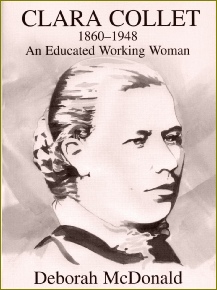



Clara Collet’s life was long and quietly eventful…the many obituaries told of how this social investigator and civil servant on matters concerning women’s work had been an influential force for government reforms in this field. Yet ‘Miss Collet’, as she was usually known, has attracted the attention of few scholars. Deborah McDonald offers the first full-
McDonald’s informative book contains some rich detail…
During the early 1890s, Collet met the writer George Gissing and their friendship is one of the more intriguing chapters in McDonald’s book.
Professor June Purvis, Women’s and Gender History, Portsmouth University. ‘Times Higher Education’ 7 May 2004
In this fine biography of an early advocate of women’s rights, readers of the ‘Journal’ will find a great deal of valuable information about Gissing, who, according to Deborah McDonald, was ‘the most important person’ in Clara Collet’s life’…
She was intimate with a daughter of Karl Marx, who was one of her father’s associates, and the two families spent much time together. The great prophet of Communism himself sometimes helped the young Collet with her studies, and she thought of him as ‘a kindly old man’.
Professor Jacob Korg, ‘Book Review’, The Gissing Journal, Volume XI, Number 3, July 2004
Clara Collet, the subject of a sympathetic full length study by Deborah McDonald, looks uncannily like a character from one of Gissing’s own novels – the proto-
… Intriguingly, Collet destroyed her diaries for the period 1892-
D.J. Taylor, The Times Literary Supplement, April 9 2004





| Clara Collet |
| J K Stephen |
| Moura Budberg |
| Clara Collet - Review |
| JK Steven - Review |
| Gallery 1 |
| Gallery 2 |
| Gallery 3 |